- Home
- Stephen R. Donaldson
Reave the Just and Other Tales Page 2
Reave the Just and Other Tales Read online
Page 2
Still it must have been true that Reave and Jillet were related. When Reave was summoned in Jillet’s name, he came.
By the time Reave arrived, however, Jillet was beyond knowing whether anyone valued him enough to tell his kinsman what had become of him.
How he first began to make his way along the road to Kelven’s enmity was never clearly known. Very well, he was a fool, as all men knew—but how had he become enmeshed in folly on this scale? A few bad bargains with usurers were conceivable. A few visits to the alchemists and mages who fed on the fringes of towns like Forebridge throughout the North Counties were conceivable, in fact hardly to be wondered at, especially when Jillet was at the painful age where he was old enough to want a woman’s love but too young to know how to get it. A few minor and ultimately forgettable feuds born of competition for trade or passion were not only conceivable but normal. Had not men and women been such small and harmless fools always? The folk of Forebridge might talk of such matters endlessly, seeking to persuade themselves that they were wiser. But who among them would have hazarded himself against Kelven Divestulata? Indeed, who among them had not at one time or another suspected that Kelven was Satan Himself, thinly disguised by swarthy flesh and knotted muscle and wiry beard?
What in the name of all the saints had possessed Jillet to fling himself into such deep waters?
The truth—which no one in Forebridge ever divined—was that Jillet brought his doom down on his own head by the simple expedient of naming himself Reave’s kinsman.
It came about in this fashion. In his early manhood, Jillet fell victim to an amiable, foolish, and quite understandable passion for the widow Huchette. Before his death, Rudolph Huchette had brought his new bride—foreign, succulent, and young—to live in the manor house now occupied by Kelven Divestulata, thinking that by keeping her far from the taints and sophistication of the cities he could keep her pure. Sadly for him, he did not live long enough after settling in Forebridge to learn that his wife was pure by nature and needed no special protection. And of course the young men of the town knew nothing of her purity. They only knew that she was foreign, young, and bereaved, imponderably delicious. Jillet’s passion was only one among many, ardent and doomed. The widow Huchette asked only of the God who watched over innocence that she be left alone.
Needless to say, she was not.
Realistically considered, the only one of her admirers truly capable of disturbing her was dour Kelven. When she spurned his advances, he laid siege to her with all the cunning bitterness of his nature. Over the course of many months, he contrived to install himself in the manor house which Rudolph had intended as her lifelong home; he cut off her avenues of escape so that her only recourse was to accept the drudgery of being his housekeeper since she steadfastly refused the grim honor of being his wife. And even there he probably had the best of her, since he was no doubt perfectly capable of binding and raping her to satisfy his admiration.
However, Jillet and the other men enamored of the widow did not consider her circumstances—and their own—realistically. As men in passion will, they chose to believe that they themselves were the gravest threat to her detachment. Blind to Kelven’s intentions, Jillet and his fellow fools went about in a fog of schemes, dreaming of ways to persuade her to reveal her inevitable preference for themselves.
However, Jillet carried this scheming farther than most—but by no means all—of his peers.
Perhaps because of his amiability—or perhaps because he was foolish—he was not ordinarily successful in competitions over women. His face and form were goodly enough, and his brown eyes showed pleasure as openly as any man’s. His kindness and cheery temper endeared him throughout Forebridge. But he lacked forthrightness, self-assertion; he lacked the qualities which inspire passion. As with women everywhere, those of Forebridge valued kindness; they were fond of it; but they did not surrender their virtue to it. They preferred heroes—or rogues.
So when Jillet first conceived his passion for the widow Huchette, he was already accustomed to the likelihood that he would not succeed.
Like Kelven Divestulata after the first year or so of the widow’s bereavement—although no one in Forebridge knew at the time what Kelven was doing—Jillet prepared a siege. He was not wise enough to ask himself, Why am I not favored in the beds of women? What must I learn in order to make myself desirable? How may I rise above the limitations which nature has placed upon me? Instead, he asked, Who can help me with this woman?
His answer had already occurred to a handful of his brighter, but no less foolish, fellows. In consequence, he was no better than the fifth or sixth man of Forebridge to approach the best-known hedgerow alchemist in the County, seeking a love potion.
According to some authorities, the chief distinction between alchemists and mages was that the former had more opportunities for charlatanism, at less hazard. Squires and earls consulted mages; plowmen and cotters, alchemists. Certainly, the man whom Jillet approached was a charlatan. He admitted as much freely in the company of folks who were wise enough not to want anything from him. But he would never have revealed the truth about himself to one such as Jillet.
Charlatan or not, however, he was growing weary of this seemingly endless sequence of men demanding love potions against the widow Huchette. One heartsick swain by the six-month or so may be profitably bilked. Three may be a source of amusement. But five or six in a season was plainly tedious. And worrisome as well: even Forebridge was capable of recognizing charlatanism when five or six love potions failed consecutively.
“Go home,” the alchemist snapped when he had been told what Jillet wanted. “The ingredients for the magick you require are arduous and expensive to obtain. I cannot satisfy you.”
But Jillet, who could not have put his hand on five farthings at that moment, replied, “I care nothing for the price. I will pay whatever is needed.” The dilemma of cost had never entered his head, but he was certain it could be resolved. The widow Huchette had gold enough, after all.
His confidence presented an entirely different dilemma to the alchemist. It was not in the nature of charlatans to refuse money. And yet too many love potions had already been dispensed. If Providence did not inspire the widow to favor one of the first four or five men, the alchemist’s reputation—and therefore his income—would be endangered. Perhaps even his person would be endangered.
Seeking to protect himself, the alchemist named a sum which should have stunned any son of a cotter.
Jillet was not stunned. Any sum was acceptable, since he had no prospect of ever paying it himself. “Very well,” he said comfortably. Then, because he wished to believe in his own cleverness, he added, “But if the potion does not succeed, you will return that sum with interest.”
“Oh, assuredly,” replied the alchemist, who found that he could not after all refuse money. “All of my magicks succeed, or I will know the reason why. Return tomorrow. Bring your gold then.”
He closed his door so that Jillet would not have a chance to change his mind.
Jillet walked home musing to himself. Now that he had time to consider the matter, he found that he had placed himself in an awkward position. True, the love of the widow Huchette promised to be a valuable investment—but it was an investment only, not coin. The alchemist would require coin. In fact, the coin was required in order to obtain the investment. And Jillet had no coin, not on the scale the alchemist had mentioned. The truth was that he had never laid mortal eyes on that scale of coin.
And he had no prospects which might be stretched to that scale, no skills which could earn it, no property which could be sold for it.
Where could a man like Jillet of Forebridge get so much money?
Where else?
Congratulating himself on his clarity of wit, Jillet went to the usurers.
He had had no dealings with usurers heretofore. But he had heard rumors. Some such “lenders” were said to be more forgiving than others, less stringent in their demands. Well
, Jillet had no need of anyone’s forgiveness; but he felt a natural preference for men with amiable reputations. From the honest alchemist, he went in search of an amiable usurer.
Unfortunately, amiable, forgiving usurers had so much kindness in their natures because they could afford it; and they could afford it because their investments were scantly at risk: they demanded collateral before hazarding coin. This baffled Jillet more than a little. The concept of collateral he could understand—just—but he could not understand why the widow Huchette did not constitute collateral. He would use the money to pay the alchemist; the alchemist would give him a love potion; the potion would win the widow; and from the widow’s holdings the usurer would be paid. Where was the fallacy in all this?
The usurer himself had no difficulty detecting the fallacy. More in sorrow than in scorn, he sent Jillet away.
Other “lenders” were similarly inclined. Only their pity varied, not their rejection.
Well, thought Jillet, I will never gain the widow without assistance. I must have the potion.
So he abandoned his search for an amiable usurer and committed himself, like a lost fish, to swim in murkier waters. He went to do business with the kind of moneylender who despised the world because he feared it. This moneylender feared the world because his substance was always at risk; and his substance was always at risk because he required no collateral. All he required was a fatal return on his investment.
“One fifth!” Jillet protested. The interest sounded high, even to him. “No other lender in Forebridge asks so much.”
“No other lender in Forebridge,” wheezed the individual whose coin was endangered, “risks so much.”
True, thought Jillet, giving the man his due. And after all, one fifth was only a number. It would not amount to much, if the widow were won swiftly. “Very well,” he replied calmly. “As you say, you ask no collateral. And my prospects cannot fail. One fifth in a year is not too much to pay for what I will gain, especially”—he cleared his throat in a dignified fashion, for emphasis—“since I will only need the use of your money for a fortnight at most.”
“A year?” The usurer nearly burst a vessel. “You will return me one fifth a week on my risk, or you can beg coin of fools like yourself, for you will get none from me!”
One fifth in a week. Perhaps for a moment Jillet was indeed stunned. Perhaps he went so far as to reconsider the course he had chosen. One fifth in a week, each and every week— And what if the potion failed? Or if it were merely slow? He would never be able to pay that first one fifth, not to mention the second or the third—and certainly not the original sum itself. Why, it was ruinous.
But then it occurred to him that one fifth, or two fifths, or twenty would make no difference to the wealth of the widow Huchette. And he would be happy besides, basking in the knowledge of a passion virtuously satisfied.
On that comfortable assumption, he agreed to the usurer’s terms.
The next day, laden with a purse containing more gold than he had ever seen in his life, Jillet of Forebridge returned to the alchemist.
By this time, the alchemist was ready for him. The essence of charlatanism was cunning, and the alchemist was nothing if not an essential charlatan. He had taken the measure of his man—as well as of his own circumstances—and had determined his response. First, of course, he counted out Jillet’s gold, testing the coins with spurious powders and honest teeth. He produced a few small fires and explosions, purely for effect: like most of his ilk, he could be impressive when he wished. Then he spoke.
“Young man, you are not the first to approach me for a potion in this matter. You are merely the first”—he hefted the purse—“to place such value on your object. Therefore I must give you a magick able to supersede all others—a magick not only capable of attaining its end, but in fact of doing so against the opposition of a—number—of intervening magicks. This is a rare and dangerous enterprise. For it to succeed, you must not only trust it entirely, but also be bold in support of it.
“Behold!”
The alchemist flourished his arms to induce more fires and explosions. When an especially noxious fume had cleared, he had in his palm a leather pouch on a thong.
“I will be plain,” said the alchemist, “for it will displease me gravely if magick of such cost and purity fails because you do not do your part. This periapt must be worn about your neck, concealed under your”—he was about to say “linen,” but Jillet’s skin clearly had no acquaintance with finery of that kind—“jerkin. As needed, it must be invoked in the following secret yet efficacious fashion.” He glared at Jillet through his eyebrows. “You must make reference to ‘my kinsman, Reave the Just.’ And you must be as unscrupulous as Reave the Just in pursuing your aim. You must falter at nothing.”
This was the alchemist’s inspiration, his cunning at work. Naturally, the pouch contained only a malodorous dirt. The magick lay in the words my kinsman, Reave the Just. Any man willing to make that astonishing claim could be sure of one thing: he would receive opportunities which would otherwise be impossible for him. Doors would be opened, audiences granted, attention paid anywhere in the North Counties, regardless of Jillet’s apparent lineage, or his lack of linen. In that sense, the magick the alchemist offered was truer than any of his previous potions. It would open the doors of houses. And conceivably, if the widow Huchette were impressionable enough, it would open the door of her heart; for what innocent and moony young female could resist the enchantment of Reave’s reputation?
So, of course, Jillet protested. Precisely because he lacked the wit to understand the alchemist’s chicanery, he failed to understand its use. Staring at his benefactor, he objected, “But Reave the Just is no kinsman of mine. My family is known in Forebridge. No one will believe me.”
Simpleton, thought the alchemist. Idiot. “They will,” he replied with a barely concealed exasperation born of fear that Jillet would demand the return of his gold, “if you are bold enough, confident enough, in your actions. The words do not need to be true. They are simply a private incantation, a way of invoking the periapt without betraying what you do. The magick will succeed if you but trust it.”
Still Jillet hesitated. Despite the strength which the mere idea of the widow Huchette exercised in his thinking, he had no comprehension of the power of ideas: he could not grasp what he might gain from the idea that he was related to Reave. “How can that be?” he asked the air more than the alchemist. No doubt deliberately, the alchemist had challenged his understanding of the world; and it was the world which should have answered him. Striving to articulate his doubt, he continued, “I want a love potion to change the way she looks at me. What will I gain by saying or acting a thing that is untrue?”
Perhaps this innocence explained some part of the affection Forebridge felt for him; but it did not endear him to the alchemist. “Now hear me,” clod, buffoon, half-wit, said the alchemist. “This magick is precious, and if you do not value it I will offer it elsewhere. The object of your desire does not desire you. You wish her to desire you. Therefore something must be altered. Either she must be made to”—stifle her natural revulsion for a clod like you—“feel a desire she lacks. Or you must be made more desirable to her. I offer both. Properly invoked, the periapt will instill desire in her. And bold action and a reputation as Reave the Just’s kinsman will make you desirable.
“What more do you require?”
Jillet was growing fuddled: he was unaccustomed to such abstract discourse. Fortunately for the alchemist’s purse, however, what filled Jillet’s head was not an idea but an image—the image of a usurer who demanded repayment at the rate of one fifth in a week, and who appeared capable of dining on Jillet’s giblets if his demands were thwarted.
Considering his situation from the perspective not of ideas but of images, Jillet found that he could not move in any direction except forward. Behind him lurked exigencies too acute to be confronted: ahead stood the widow Huchette and passion.
; “Very well,” he said, making his first attempt to emulate Reave’s legendary decisiveness. “Give me the pouch.”
Gravely, the alchemist set the pouch in Jillet’s hand.
In similar fashion, Jillet hung the thong about his neck and concealed the periapt under his jerkin.
Then he returned to Forebridge, armed with magick and cunning—and completely unshielded by any idea of what to do with his new weaponry.
The words trust and bold and unscrupulous rang in his mind. What did they mean? Trust came to him naturally; bold was incomprehensible; unscrupulous conveyed a note of dishonesty. Taken together, they seemed as queer as a hog with a chicken’s head—or an amiable usurer. Jillet was altogether at sea.
In that state, he chanced to encounter one of his fellow pretenders to the widow Huchette’s bed, a stout, hairy, and frequently besotted fletcher named Slup. Not many days ago, Slup had viewed Jillet as a rival, perhaps even as a foe; he had behaved toward Jillet in a surly way which had baffled Jillet’s amiable nature. Since that time, however, Slup had obtained his own alchemick potion, and new confidence restored his goodwill. Hailing Jillet cheerfully, he asked where his old friend had been hiding for the past day or so.
Trust, Jillet thought. Bold. Unscrupulous. It was natural, was it not, that magick made no sense to ordinary men? If an ordinary man, therefore, wished to benefit from magick, he must require himself to behave in ways which made no sense.
Summoning his resolve, he replied, “Speaking with my kinsman, Reave the Just,” and strode past Slup without further explanation.
He did not know it, of course, but he had done enough. With those few words, he had invoked the power, not of the periapt, but of ideas. Slup told what he had heard to others, who repeated it to still others. Within hours, discussion had ranged from one end of the village to the other. The absence of explanation—when had Jillet come upon such a relation? why had he never mentioned it before? how had Reave the Just, of all men, contrived to visit Forebridge without attracting notice?—far from proving a hindrance, actually enhanced the efficacy of Jillet’s utterance. When he went to his favorite tavern that evening, hoping to meet with some hearty friend who would stand him a tankard of ale, he found that every man he knew had been transformed—or he himself had.

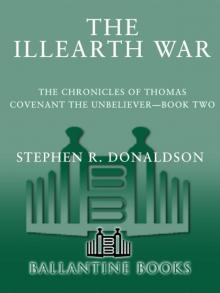 The Illearth War
The Illearth War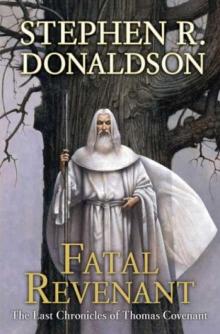 Last Chronicles of Thomas Covenant 02 - Fatal Revenant
Last Chronicles of Thomas Covenant 02 - Fatal Revenant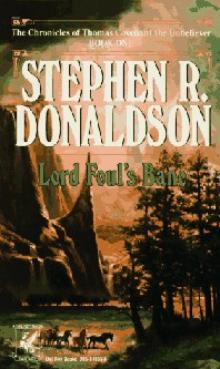 Lord Foul's Bane
Lord Foul's Bane The Gap Into Ruin: This Day All Gods Die
The Gap Into Ruin: This Day All Gods Die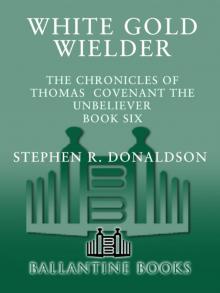 White Gold Wielder
White Gold Wielder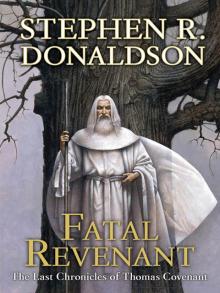 Fatal Revenant
Fatal Revenant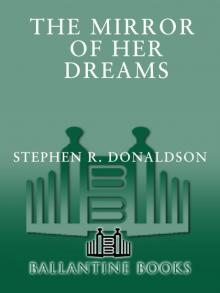 The Mirror of Her Dreams
The Mirror of Her Dreams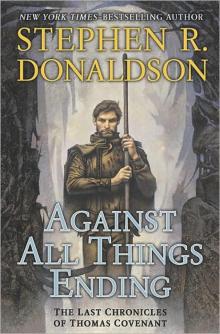 Against All Things Ending
Against All Things Ending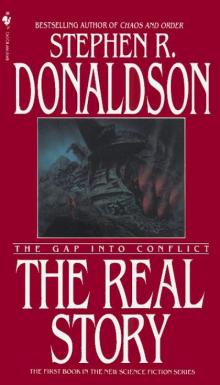 The Real Story: The Gap Into Conflict
The Real Story: The Gap Into Conflict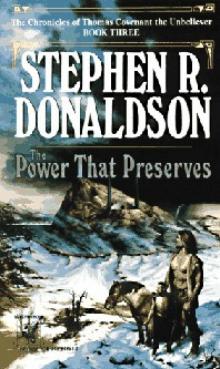 The Power That Preserves
The Power That Preserves Seventh Decimate
Seventh Decimate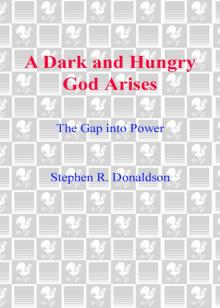 The Gap Into Power: A Dark and Hungry God Arises
The Gap Into Power: A Dark and Hungry God Arises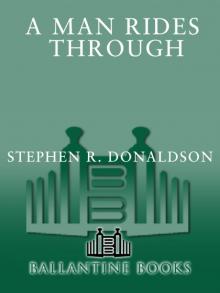 A Man Rides Through
A Man Rides Through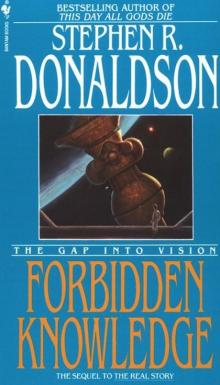 The Gap Into Vision: Forbidden Knowledge
The Gap Into Vision: Forbidden Knowledge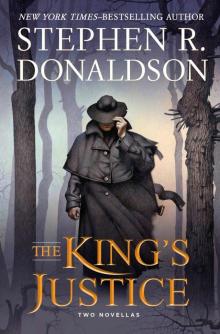 The King's Justice: Two Novellas
The King's Justice: Two Novellas The Wounded Land
The Wounded Land The Runes of the Earth
The Runes of the Earth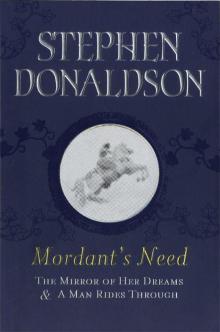 Mordant's Need
Mordant's Need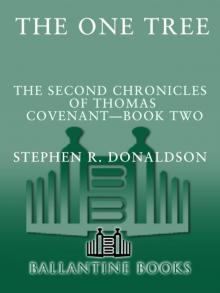 The One Tree
The One Tree Gilden-Fire
Gilden-Fire Reave the Just and Other Tales
Reave the Just and Other Tales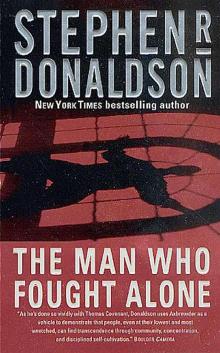 The Man Who Fought Alone
The Man Who Fought Alone The Last Dark
The Last Dark The Man Who Tried to Get Away
The Man Who Tried to Get Away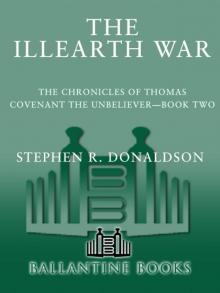 Thomas Covenant 02: The Illearth War
Thomas Covenant 02: The Illearth War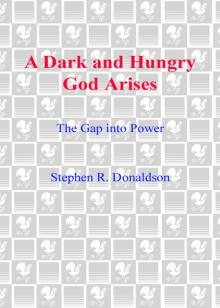 A Dark and Hungry God Arises
A Dark and Hungry God Arises The One Tree t2cotc-2
The One Tree t2cotc-2 Lord Foul's Bane cotc-1
Lord Foul's Bane cotc-1 The Illearth War t1cotc-2
The Illearth War t1cotc-2 The Runes of the Earth: The Last Chronicles of Thomas Covenant - Book One
The Runes of the Earth: The Last Chronicles of Thomas Covenant - Book One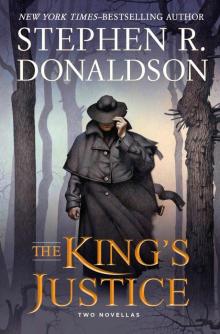 The King's Justice
The King's Justice White Gold Wielder t2cotc-3
White Gold Wielder t2cotc-3 The Power That Preserves t1cotc-3
The Power That Preserves t1cotc-3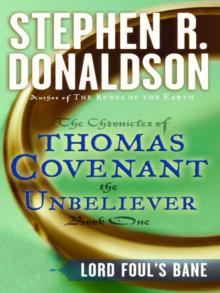 Thomas Covenant 01: Lord Foul's Bane
Thomas Covenant 01: Lord Foul's Bane Chaos and Order: The Gap Into Madness
Chaos and Order: The Gap Into Madness Daughter of Regals
Daughter of Regals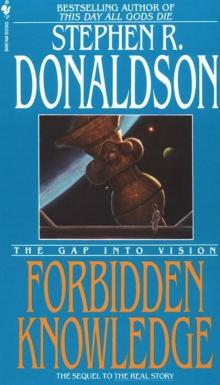 Forbidden Knowledge: The Gap Into Vision
Forbidden Knowledge: The Gap Into Vision Fatal Revenant t3cotc-2
Fatal Revenant t3cotc-2 The Runes of the Earth t3cotc-1
The Runes of the Earth t3cotc-1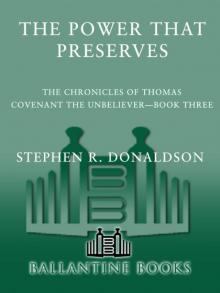 Thomas Covenant 03: Power That Preserves
Thomas Covenant 03: Power That Preserves This Day all Gods Die: The Gap into Ruin
This Day all Gods Die: The Gap into Ruin The Wounded Land t2cotc-1
The Wounded Land t2cotc-1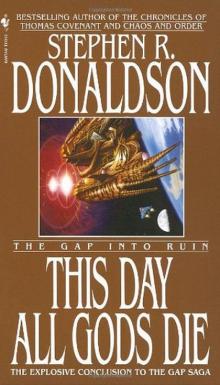 This Day All Gods Die
This Day All Gods Die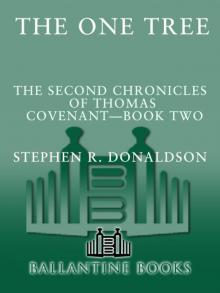 One Tree
One Tree